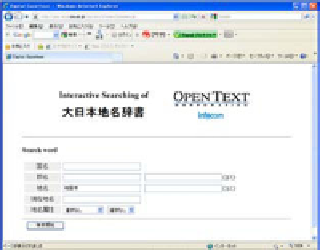Information Technology Reference
In-Depth Information
5 Ontology Databases
Two databases, the “Japanese Historical Gazetteer” and the “Calendar Database”,
have been developed by the H-GIS to support spatiotemporal data organization for
databases and to add advanced data retrieval functions to RSSs. Strictly speaking,
they are, at present, “thesauri” rather than ontology dictionaries.
5.1 Japanese Historical Gazetteer
The “Japanese Historical Gazetteer” [19] is a simple thesaurus. Entry words of the
thesaurus are historical place names in Japan collected from “Dainihon Chimei Jisho
(Dictionary of Place Names in Greater Japan compiled by Togo Yoshida)”, “Engishi
Jinmyocho (Procedures of the Engi Era)”, “Nihon Jiin Sokan (Directory of Japanese
Temples)”, “Jinsoku-zu (Quick Mastery Maps: Kanto Region)”, and “Kasei-zu
(Temporary Maps: Kinki Region)”. At present, about 150,000 place names are
registered in the Gazetteer. This is the largest free academic gazetteer database in
Japan. Each entry word includes its present place name, attributes (pronunciation of
the place name, types of the place, broader and narrower place names and so on), and
geographic coordinates (longitude and latitude).
This gazetteer will be used to identify correct place names, to convert a place name
into a pair of coordinates, to visualize spatial relationships between places, to analyze
spatial patterns of particular place names and so on. Figure 7 shows example displays
of the Gazetteer (searching for the Shokoku-ji Temple).
(a) (b)
Fig. 7.
Example Displays of Japanese Historical Gazetteer:
(a) is a search window, and (b)
shows its retrieval displays
5.2 Calendar Database
The “Calendar Database” is a simple table to organize all dates (Japanese dates,
Chinese dates, Gregorian dates and so on) according to Julian dates. It is used to
convert a date from one calendar to another.


